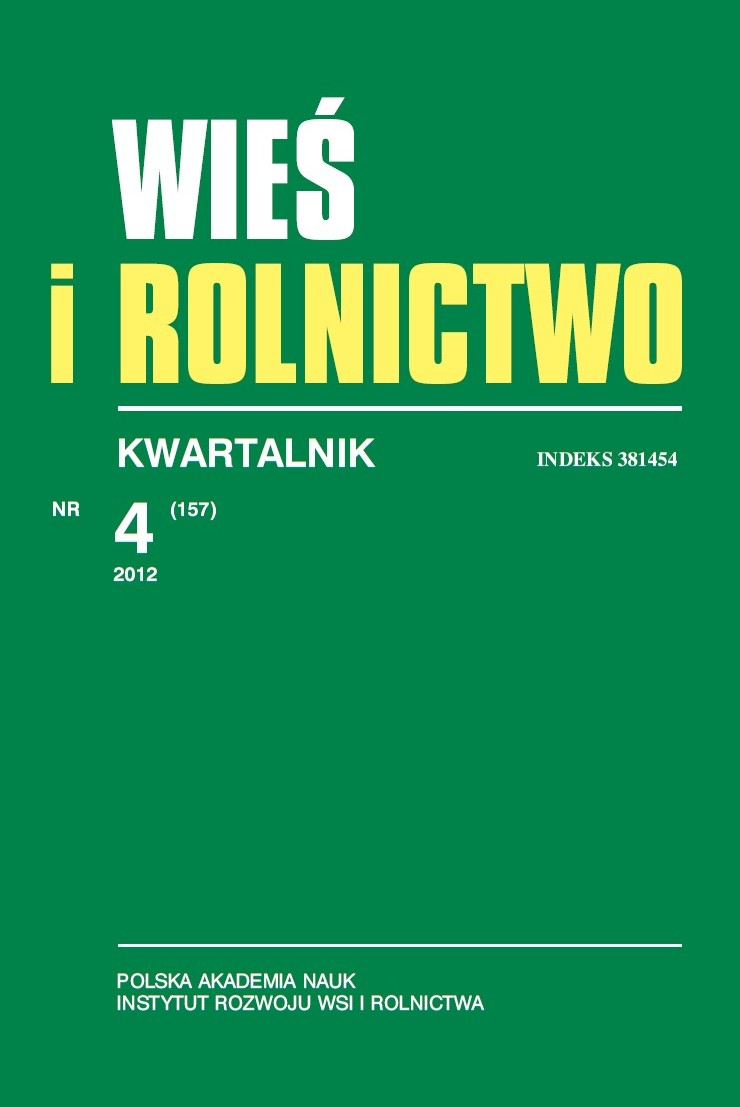Land grabbing as a new form of economic imperialism
DOI:
https://doi.org/10.53098/wir.2012.4.157/02Keywords:
land grabbing, failed states, food security, land speculation, African agricultureAbstract
The aim of the presentation is to analyze the phenomenon of land grabbing which occurs primarily in countries with questionable quality of institutions, often in countries considered as the so called failed states. The process of land grabbing is undertaken with active participation of foreign countries and multinational corporations. The end of the first decade of the 21st century saw, apart from the global crisis, the phenomenon of large-scale grabbing or taking control of the agricultural property by foreign entities. The majority of such transactions were (and still are) done with the violation of the law. Since land grabbing is a new phenomenon there are no regulations relating to it and control by international institutions is insufficient. This leads to a moral hazard in the form of efforts to deprive local farmers of their ownership rights to land and rights to their produce. This, in turn, often leads to social exclusion. Ultimately, land grabbing results in the concentration of land property in the hands of a small number of foreign owners and the risk of economic exploitation of the local community. The direction in which the phenomenon of land grabbing is developing and the involvement of Western financial corporations in the process create a growing risk of infecting third countries with land speculation phenomena which may lead to speculation bubbles on successive markets - this time located in the poorest countries of the world. The presentation will explore these phenomena and their consequences for the evolution of the host countries and the world economy.References
Alshareef T., 2009: King Abdulla's Initiative for Agricultural Investment Abroad. Food and Environmental Security; The Role of Food and Agricultural Trade Policy. Salzburg, Austria, May 10–11, 2009 (http://www.agritradeorg/events/documents/Alshareef.pdf).
Braun von J., Meinzen-Dick R., 2010: ”Land Grabbing” by Foreign Investors in Developing Countries: Risks and Opportunities. ”IFPRI Policy Brief” 13 (http://www.ifpri.org/sites/default/files/publications/bp013all.pdf).
Brown L., 2011: The Great Food Crisis of Food 2011. ”Foreign Policy”, 10 January 2011 (http://www.foreignpolicy.com/articles/2011/01/10/the_great_food_crisis_of_2011; dostęp 15 sierpnia).
Castel V., Kamara A., 2009: Foreign Investments in Africa's Agricultural Land: Implications for Rural Sector Development and Poverty Reduction. African Development Bank, Development Research Brief 2, April.
Climate Change and Food Security, Adapting Agriculture to a Warmer World, 2010. Ed. D. Lobell, M. Burke. Springer, New York.
Cotula L., Dyer N., Vermeulen S., 2008: Fuelling Exclusion? The Biofuels Boom and Poor People's Access to Land. FAO & IEED.
Cotula L., Vermeulen S., Leonard R., Keeley L., 2009: Land grab or development opportunity? Agricultural investment and international land deals in Africa. IIED/FAO/IFAD, London – Rome.
Deininger K., Byerlee D., Lindsay J., Norton A., Selod H., Stickler M., 2011: Rising Global Interest in Farmland. Can It yield Sustainable and Evitable benefits. Agriculture and Rural Development, World Bank, Washington. DOI: https://doi.org/10.1596/978-0-8213-8591-3
Grain Reserves and the Food Price Crisis: Selected Writings from 2008–2012, 2010. Institute for Agriculture and Trade Policy, IATP, 16 July (http://www. iatp. org/documents/grain-reservesand-the-food-price-crisis-selected-writings-from-2008-2012; dostęp 16 sierpnia 2012).
Herren H., 2012: The Great Food Robbery: How Corporations Control Food, Gran Land and Destroy the Climate. GRAIN, Barcelona.
James B., 2010: Hassad Food plans to invest $700mn in global Project. ”Gulf Times” 1 June (http: //www.gulf-times.com/site/topics/article.asp?cu_no=2&item_no=365205&version=1&template_id=36&parent_id=16; dostęp 25 sierpnia 2012).
Kastner J., 2010: Food Security Policy. An Historical Multidisciplinary Approach. Greenwood Publishing Group, Santa Barbara.
Land grab or development opportunity? ”New Agriculturist” (http://www.new-ag.info/en/pov/views.php? a=2099; dostęp 15 sierpnia 2012).
LAND GRAB? The Race for the World's Farmland, 2009. Ed. M. Kugelman, S. Levenstein. Woodrow Wilson International Center for Scholars, Washington.
Land grabbing by pension funds and other financial institutions must be stopped, 2012. Food Crisis and the Global Land Grab, 26 June (http://farmlandgrab.org/post/view/20716; dostęp 10 września 2012).
Małysz J., 1991: Bezpieczeństwo żywnościowe – strategiczna potrzeba ludzkości. Wydawnictwo Naukowe PWN, Warszawa.
Maslow A.H., 1954: Motivation and Personality. Harper & Row, New York.
McKee D., 2011: Strategic Grain Reserves. ”World-Grain.com” 24 May (http://www.world-grain. com/News/News%20Home/Features/2011/5/Strategic%20grain%20reserves.aspx; dostęp 16 sierpnia 2012).
Pearse F., 2012: The Land Grabbers: The new Fight over Who Owns the Earth. Beacon Press, Boston.
Regewadden R., 2009: Madagascar: Daewoo's rainforest land grab in nature's paradise, In: Food Crisis and the Global Land Grab, 19 June (http://farmlandgrab.org/5661; dostęp 15 sierpnia 2012).
Ridberg R., 2010: Commodities Now Land Grab post, Innovations in Access to Land: Land Grab or Agricultural Investment? Washington DC (http://www.commodities-now.com/reports/agriculture-and-softs/3222-innovations-in-access-to-land-land-grab-or-agricultural-investment.html; dostęp 20 września 2012).
Shaw D.J., 2007: World Food Security: A History Since 1945, Palgrave McMillan, Hampshire – New York.
The emerging equity gap: Growth and stability in the new investor landscape, 2011. Ed. Ch. Roxburgh. McKinsey Global Institute (www.wilsoncenter.org; dostęp 10 września 2012).
The GCC in 2020: Resources for the future, 2010. A report from the Economist Intelligence Unit, ”The Economist”.
Wouterse F. et al., 2010: Foreign Direct investment in land in West Africa. Status quo, lessons from other regions, implication for research. ”West and Central Africa Office Thematic Research Note”, 01 3 (www.ifpri.org/sites/default/files/... /wcaotn01.pdf; dostęp 20 sierpnia 2012).
The Great Food Robbery: How Corporations Control Food, Grab Land and Destroy the Climate, 2012. GRAIN, Fahamu-Pambazuka.
Weiner E.I., 2010: The Shadow Market, How a Group of Wealthy Nations and Powerful Investors Sercretly Dominate the World. Scribner, New York.
Wouterse F. et al., 2010: Foreign Direct investment in land in West Africa. Status quo, lessons from other regions, implication for research. ”West and Central Africa Office Thematic Research Note”, 01 3 (www.ifpri.org/sites/default/files/... /wcaotn01.df; dostęp 20 sierpnia 2012).
Downloads
Article file downloads
Pages
How to Cite
Issue
Section
License
Copyright (c) 2012 Wieś i Rolnictwo

This work is licensed under a Creative Commons Attribution 4.0 International License.










